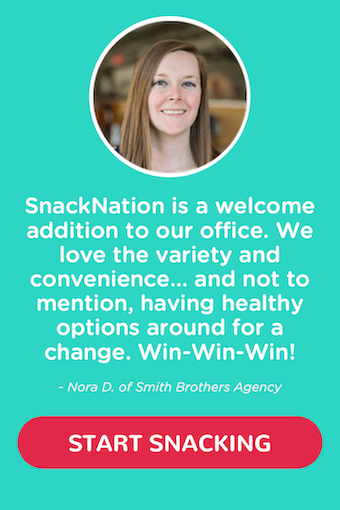I’m convinced that all entrepreneurs eventually come to the same conclusion – there’s just about nothing that’s more important to your company than its culture.
Companies are, after all, nothing without the people who inhabit them. And there are few things that shape a company’s culture more than its core values. Your core values influence norms and behavior, help differentiate your employer brand for potential new hires, and ultimately trickle out to your external-facing brand and product.
But developing core values is not easy. Effective core values must be succinct, easily digestible, and uniquely ownable. At the same time, they must be broad enough to inspire all the behaviors that will help your company achieve its mission.
Entrepreneurs often ask me how SnackNation developed its five core values. So in the spirit of paying it forward, I’ve laid out our nine best learnings from this experience.
Here’s how SnackNation developed the five values that guide us in everything we do.
1. Values Are Discovered, Not Created
To some degree core values are aspirational – an expression of you and your team at your best.
But your values aren’t created out of thin air. In a very real sense, you are already living your core values. They are the unwritten rules that underpin behaviors, embedded in the way you already do business. It’s the way your team shows up, how you communicate, and how you tackle tough problems.
So approach the process with this in mind: your job as a leader isn’t to create your core values, it is simply to identify and articulate them.
2. Develop Your Values with Senior Leaders
It’s also important to note that while values already exist throughout the organization, I don’t recommend opening the development process up to your entire company, especially if you have a big team. It might seem democratic, but this process requires precision, and a bottom-up approach will produce muddled results. Your team is actually looking to leadership to guide this process. So take the yoke.
3. Start with Personal Values
Here’s another fact I’ve learned throughout my career as an entrepreneur and leader:
Business values = personal values.
It’s simple, but not obvious for most leaders. Values must be authentic to who you are, and business and personal values will always be inextricably linked.
How does this show up in the process? Start by defining the personal values that guide decision making for the business and cultural leaders at your organization. Staying authentic is a key point when defining company values, as they will be intertwined with your company culture for years to come.
At the outset of this process, I asked our leadership team during our weekly meeting to come up with the most important values that guide their individual decision making, both in business and life.
Two tactical keys here – first, it has to start as an individual exercise. You don’t want group bias to direct which values gain traction. Second, challenge the group to keep it simple, one or two words if possible. This will prove valuable later in the process.
4. Tally Up the Top Ten
Next, take the individual lists, share them with the group and see which values recur most often.
We actually found that there was a ton of commonality between the individual lists – which is a good sign! It means your values are real and already at work in your culture. Inevitably though, there will be differences of opinion – there certainly was for our group.
And that’s where the fun begins.
5. Combine Where Appropriate
Your next job is to take that list of 10 values and, as a group, narrow it down to as few as possible.
How many exactly? It depends, but as a general rule, five is a good number, seven is pushing it.
There are a few key ways to narrow your list. Start by combining ideas that are either redundant or that pair well.
For example, here are two drafts of values that showed up in our exercise –
Be resilient in the face of adversity.
Display humility in victory and defeat.
Because both values fundamentally speak to conduct, these values could be combined to –
Display grit without ego.
As you can see the result is succinct, easy to understand, yet also expansive enough to apply to all sorts of situations. And it’s uniquely ownable to us.
6. Jettison All But the essential
Remember these aren’t all your values, these are your organization’s core, defining values.
One example:
“Do the right thing” was a core value from HUMAN, our prior company that helped lay the foundation for SnackNation.
When “do the right thing” came up, there were many in the room who argued passionately that we should keep it – after all, what’s more important than doing the right thing?
But several others felt just as strongly that it had to go. Their argument was that it was far too basic, and definitely not ownable. If we have to tell people something as rudimentary as do the right thing, is our culture really that strong?
Ultimately, the nays persuaded the yeas, and we dropped it.
The discussion will get spirited. But arguing is encouraged here – in fact, it’s sort of the point. The fight for these ideas will reveal something, and the top values are the ones that rise above the fray.
Work things out until you reach consensus on your final 5-7 values.
7. Use Verbs to Inspire Action
Because they are so closely linked to decision making, the final form your values take should imply behavior. Take SnackNation’s core values. Notice that all but one start with a strong action verb.
- Health above all else
- Display grit without ego
- Serve and inspire
- Seek perpetual growth
- Spread joy and optimism
8. Test Them Out for Two Weeks
Once you have consensus around your five values, it’s time to try them out.
Print out your list, place it on your desk or on your mirror, and check in with them daily. Are these values compelling? Do they feel true to who you are? Do they inspire action? Are you as excited about them on day 1 as day 14?
Now really try them out. During this two week stint, you will likely face a difficult decision. Use your values to guide you to a resolution. Were your values useful? Would you have made the same decision without your stated values?
All in all, the whole process should take about a month. two weeks to reach consensus, and another two weeks to sit with and test out your values.
9. Unleash Your Values Everywhere
You should definitely put your values prominently on display in your office, but it can’t end there.
Core values do send important signals to potential new hires, investors, and even consumers about who you are. But the real purpose of core values is to drive decision making.
This cannot be overstated: if you aren’t using your core values to make choices – especially hard choices – then these aren’t really your values at all.
Use your values daily. Let them guide the way you recognize your team. Talk about them in every meeting. Hire around them. Innovate around them.
Here’s how we live our core values at SnackNation:
Recognition
Crush-it Call is our signature cultural practice. Every Friday at 4:00 the entire company gathers and individuals take turns recognizing team mates for embodying one of our core values that week.
Likewise, Value Victor is our monthly values-based recognition program. Leaders nominate and vote on two employees whose performance exemplifies one or more of our values. In both instances, our values are celebrated and reinforced.
Goal Setting
As we’re setting priorities through OKRs (Objective and Key Results), we associate each goal/project with a Core Value that is closely aligned.
Teamwide Communication
When giving presentations to our team or depts that attempt to alter behaviors, we always do this through the lens of our values. Employees are much more likely to change their behavior when their is a strong “Why” attached to it, and there’s nothing stronger in the context of our company than our values.
Your core values are who you are, and who you are is your competitive advantage.
Do you have a tip that I didn’t cover? Let’s continue the conversation in the comments.













Communication of company values is key!
Walking out on the shop floor and just talking and getting to know our people is rewarding. I love getting their feedback and listening to them. They want to know that they matter and are heard! They ask about the snack and when we should see them and tell me their favs!